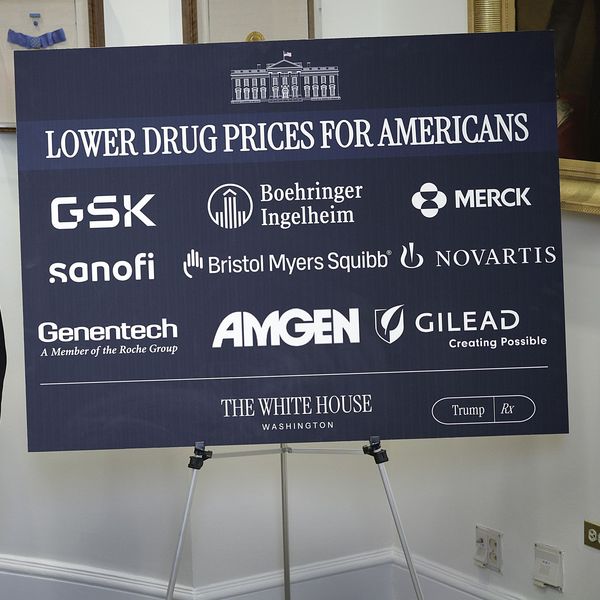Crippling Dominance of Big Pharma, Indian Judge Blocks Bayer's Drug Monopoly Bid
Judge upholds ruling which protects interests of public health over intellectual property
In a move that advocates are saying is a "momentous" win for public health, an Indian court on Friday rejected a bid from multinational pharmaceutical giant Bayer to block a local generic drug company from mimicking their costly cancer drug.
Bayer had attempted to appeal a 2012 decision by India's patent controller, who had argued the monthly $5,500-per-person cost charged by Bayer for the liver and kidney drug Nexevar was too costly for most Indians. The Hyderabad-based Natco Pharma's version of the drug costs roughly 97% less.
Friday's court's decision highlights India's "critical role" in "balancing intellectual property and public health," Leena Menghaney, South Asia regional head of Medicins San Frontieres (MSF)/ Doctor's Without Borders' regional access campaign, told AFP.
Observers are saying that the decision may have far-reaching impact on the drug market because of India's dominance in the pharmaceutical industry. AFP reports:
India'a Lawyers' Collective, another rights group, said the "momentous" judgement held wide-ranging implications for access to other medicines.
India's vast generics industry is a major supplier of cheap copycat, life-saving drugs to treat diabetes, cancer and other diseases afflicting people locally and globally who cannot afford expensive branded versions.
An Urgent Message From Our Co-Founder
Dear Common Dreams reader, The U.S. is on a fast track to authoritarianism like nothing I've ever seen. Meanwhile, corporate news outlets are utterly capitulating to Trump, twisting their coverage to avoid drawing his ire while lining up to stuff cash in his pockets. That's why I believe that Common Dreams is doing the best and most consequential reporting that we've ever done. Our small but mighty team is a progressive reporting powerhouse, covering the news every day that the corporate media never will. Our mission has always been simple: To inform. To inspire. And to ignite change for the common good. Now here's the key piece that I want all our readers to understand: None of this would be possible without your financial support. That's not just some fundraising cliche. It's the absolute and literal truth. We don't accept corporate advertising and never will. We don't have a paywall because we don't think people should be blocked from critical news based on their ability to pay. Everything we do is funded by the donations of readers like you. Will you donate now to help power the nonprofit, independent reporting of Common Dreams? Thank you for being a vital member of our community. Together, we can keep independent journalism alive when it’s needed most. - Craig Brown, Co-founder |
In a move that advocates are saying is a "momentous" win for public health, an Indian court on Friday rejected a bid from multinational pharmaceutical giant Bayer to block a local generic drug company from mimicking their costly cancer drug.
Bayer had attempted to appeal a 2012 decision by India's patent controller, who had argued the monthly $5,500-per-person cost charged by Bayer for the liver and kidney drug Nexevar was too costly for most Indians. The Hyderabad-based Natco Pharma's version of the drug costs roughly 97% less.
Friday's court's decision highlights India's "critical role" in "balancing intellectual property and public health," Leena Menghaney, South Asia regional head of Medicins San Frontieres (MSF)/ Doctor's Without Borders' regional access campaign, told AFP.
Observers are saying that the decision may have far-reaching impact on the drug market because of India's dominance in the pharmaceutical industry. AFP reports:
India'a Lawyers' Collective, another rights group, said the "momentous" judgement held wide-ranging implications for access to other medicines.
India's vast generics industry is a major supplier of cheap copycat, life-saving drugs to treat diabetes, cancer and other diseases afflicting people locally and globally who cannot afford expensive branded versions.
In a move that advocates are saying is a "momentous" win for public health, an Indian court on Friday rejected a bid from multinational pharmaceutical giant Bayer to block a local generic drug company from mimicking their costly cancer drug.
Bayer had attempted to appeal a 2012 decision by India's patent controller, who had argued the monthly $5,500-per-person cost charged by Bayer for the liver and kidney drug Nexevar was too costly for most Indians. The Hyderabad-based Natco Pharma's version of the drug costs roughly 97% less.
Friday's court's decision highlights India's "critical role" in "balancing intellectual property and public health," Leena Menghaney, South Asia regional head of Medicins San Frontieres (MSF)/ Doctor's Without Borders' regional access campaign, told AFP.
Observers are saying that the decision may have far-reaching impact on the drug market because of India's dominance in the pharmaceutical industry. AFP reports:
India'a Lawyers' Collective, another rights group, said the "momentous" judgement held wide-ranging implications for access to other medicines.
India's vast generics industry is a major supplier of cheap copycat, life-saving drugs to treat diabetes, cancer and other diseases afflicting people locally and globally who cannot afford expensive branded versions.

